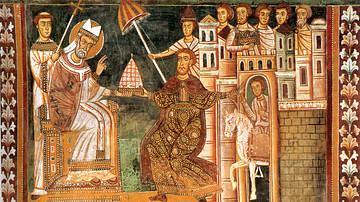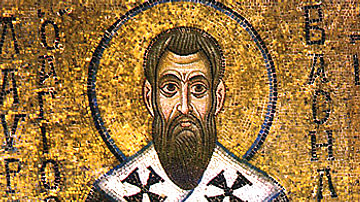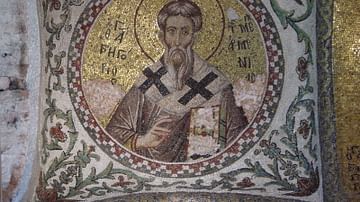Search
Search Results

Definition
Empress Irene
Empress Irene was the wife of Leo IV and, on her husband's death, she reigned as regent for her son Constantine VI from 780 to 790 CE. From 797 to 802 CE she ruled as emperor in her own right, the first woman to do so in Byzantine history...

Definition
Donation of Constantine
The Donation of Constantine (Donatio Constantini or the Donatio) is a medieval forgery dated to the 8th century purporting to be an original 4th-century document in which the Roman emperor Constantine the Great (r. 306-337) granted supreme...

Definition
Heraclius
Heraclius (Herakleios) was emperor of the Byzantine Empire from 610 to 641 CE. He crushed the Persian empire and returned the looted True Cross to Jerusalem, but the second half of his reign was beset by intrigues and ecclesiastical controversies...

Definition
New English Canaan
New English Canaan is a three-volume work of history, natural history, satire, and poetry by the lawyer and New England colonist Thomas Morton (l. c. 1579-1647 CE) published in 1637 CE. The book developed out of legal briefs Morton prepared...

Definition
Emperor Zeno
Zeno was Byzantine emperor from 474 until 491 CE. An ethnic Isaurian, Zeno was repeatedly criticized as an outsider during his reign, which was full of rebellions and attacks by the Ostrogoths. He is best known for his failed attempt to compromise...

Definition
Basil the Great
Saint Basil (c. 330 - c. 379 CE), also known as Basil the Great and Basil of Caesarea, was a bishop of Caesarea in central Asia Minor who staunchly defended the church against the 4th-century CE heresy of Arianism. Basil's writings on monasticism...

Definition
Argead Dynasty
The Argead dynasty, the ancient Macedonian house of Dorian Greek origin, lasted from the 7th century to 310 BCE. The mythological founder of the dynasty was King Caranus but it was under Philip II of Macedon (382-226 BCE) that the Macedonian...

Definition
Saint Gregory the Illuminator
Saint Gregory the Illuminator or Enlightener (previously known as Grigor Lusavorich, c. 239 - c. 330 CE) was the first bishop of the Armenian church, and he is widely credited with converting king Tiridates the Great to Christianity, formally...

Definition
Martin Bucer
Martin Bucer (l. 1491-1551) was a German reformer and theologian who had been a Dominican friar and priest until converted to the Protestant vision by Martin Luther (l. 1483-1546) c. 1518. Bucer is best known for his focus on unity among...

Definition
Constantine VI
Constantine VI, also known as Constantine "the Blinded”, was emperor of the Byzantine Empire from 780 to 797 CE, although for most of his reign his mother, Irene the Athenian, ruled as regent. When Constantine did finally get a go at ruling...